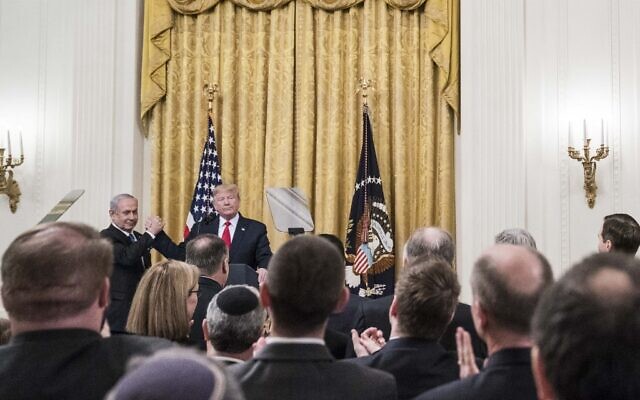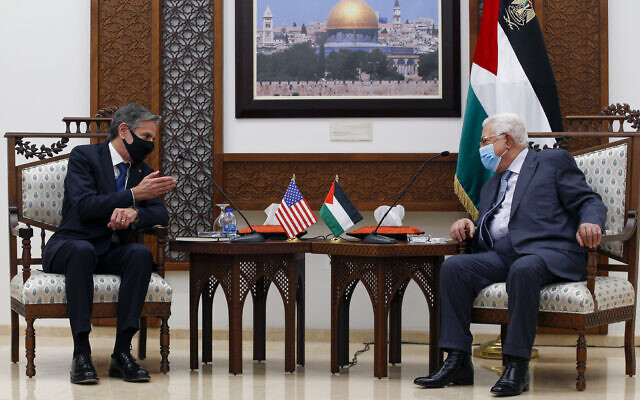During a moment of candor on the 2020 presidential campaign trail, a senior foreign policy adviser to then-candidate Joe Biden acknowledged that the Middle East would be a “distant fourth” on the list of areas where the Democrat would prioritize diplomatic engagement, after the Indo-Pacific, Europe and Latin America.
This was during a 2020 election season in which Biden focused almost entirely on domestic issues, keying in to Americans who have been most concerned with weathering the health and economic ramifications of the pandemic.
Even within the Middle East, the Israeli Palestinian conflict fell toward the bottom of that “distant fourth” category; Biden’s biggest concern in the region has been the Iranian nuclear threat, exacerbated by what he believes was his predecessor’s erroneous decision to withdraw from the multilateral deal that managed to “keep the program in a box.”
Israeli and Palestinian officials are under no illusions about the bandwidth the US has for their issue. In conversations with The Times of Israel over the past year, US-based diplomats representing Jerusalem and Ramallah have recognized that the conflict trails well behind the “three Cs” — COVID, China and climate change — on Biden’s agenda.
So it’s been little surprise that Biden has dealt with the Israeli-Palestinian conflict by setting modest goals and marking even more modest accomplishments during his first 365 days in office.
Unlike the previous administration, there’s a clear commitment to the two-state model for solving the conflict, and also unlike former president Donald Trump, Biden did not enter office declaring his intention to launch high-stakes peace talks aimed at inking the “ultimate deal” between Israelis and Palestinians.

US President Donald Trump and Prime Minister Benjamin Netanyahu participate in a joint statement unveiling the US peace plan in the East Room of the White House on January 28, 2020 in Washington, DC. (Sarah Silbiger/Getty Images/AFP)
Instead, the Biden administration came in with a clear-eyed view of the towering challenges that would need to be overcome.
“The respective leaderships are far apart on final-status issues, Israeli and Palestinian politics are fraught, and trust between the two sides is at a nadir,” Deputy US Ambassador to the UN Richard Mills said in the administration’s first public comments on the conflict last January.
Accordingly, the administration has focused on creating the conditions on the ground that are necessary for an eventual two-state solution, while discouraging steps that distance the parties from that end. These principles are reiterated in almost every statement the US government releases regarding the conflict.
“We believe it’s critical to refrain from unilateral steps that increase tensions and make it more difficult to advance a negotiated two-state solution,” reads the start of a talking point employed dozens of times by various Biden officials. It concludes with the insistence that “Israelis and Palestinians alike deserve equal measures of freedom, prosperity, and dignity.”
The reliance on shopworn talking points that rarely offer anything new on the subject has been recognized by analysts as a sign of Biden’s decision to focus resources elsewhere.
“The Biden administration certainly is of the view that two-states is something that is worth working toward and is something that can still be accomplished,” said Israel Policy Forum policy director Michael Koplow, whose organization maintains regular contact with US officials. “Where I think some of the difficulty comes in is that it’s no secret this administration’s priorities are not with this issue.”
Nonetheless, some in the White House have pushed back on the idea that the administration is not focused on the conflict and have tried to reframe the issue.

Protesters demonstrate in the East Jerusalem neighborhood of Sheikh Jarrah on July 30, 2021. (Olivier Fitoussi/Flash90)
“I’m often asked, ‘Are we de-prioritizing the Middle East and our friends in the Middle East?’ And nothing could be further from the truth,” a senior White House official said in a briefing with reporters last August. “If anything, in the Biden administration, we are not pursuing unachievable goals.”
The point was reiterated almost verbatim last week by the White House National Security Council’s Middle East coordinator Brett McGurk, who went on to argue that “ensur[ing] the embers of potential conflict are dampened so we don’t have the risk of a breakout of another conflict is a top tier priority” for the Biden administration when it comes to Israelis and Palestinians.
Translation: The Biden administration has resigned itself to preventing the next war, rather than brokering the next peace deal.
That focus was made clear in a briefing last month, when a senior administration official pointed to the fact that the May 2021 Gaza war lasted 11 days, compared to the 51-day conflict in 2014, as one of the president’s main accomplishments on the Israeli-Palestinian front thus far.
“It was quite a lot of quiet diplomacy, hands-on diplomacy, led directly by President Biden, that the war wound down in 11 days,” said the Biden aide. “I think that was due to a lot of relationship-building that we had done in the earliest months of the administration.”
What engagement the administration has had with Israel has been warm, if low-key.
Unlike the disputes that played out in the public eye between Jerusalem and Washington during the Barack Obama administration, Biden has been “guided by a belief that disagreements should be kept behind closed doors when at all possible,” said one senior US diplomat, who spoke on condition of anonymity.
The diplomat said that the new policy has translated to regular high-level meetings between senior Biden officials and their Israeli counterparts, with Washington’s goal being to assure Jerusalem that it takes its concerns seriously.

Illustrative: Smoke rises following Israeli missile strikes on Gaza City on May 13, 2021. (AP/Khalil Hamra)
The relationship was kicked into high gear when Naftali Bennett replaced Benjamin Netanyahu as prime minister in June. Biden phoned Bennett to congratulate him hours after he was sworn in, a stark contrast to the four weeks the president waited before taking Netanyahu’s call after his inauguration.
Bennett was one of the first world leaders to receive an invitation to the White House and the two warmly embraced during a lengthy meeting in August, even as Biden was in the midst of dealing with a crisis unfolding in Afghanistan.
The toasty embrace of Israel — particularly during the Gaza war when Biden repeatedly backed Israel’s right to defend itself from Hamas rocket fire and blocked UN Security Council joint statements blaming both sides for the violence — gave Washington the diplomatic space to publicly criticize Jerusalem when it felt the need, without the censure spiraling into a larger diplomatic spat.
On Israeli settlement approvals, home demolitions and evictions, the Biden administration has sounded its disapproval without any caveats.
The approach works for Jerusalem, which recognizes that the criticism comes from a place of “genuine care for the Jewish state,” a senior aide to an Israeli minister told The Times of Israel.
At the same time, Israel appreciates the fact that the words are unlikely to translate into actions “as the administration’s plate is full and [it’s] not interested in a public spat with one of its closest allies anyways,” the aide said.

Palestinian Authority President Mahmoud Abbas, right, meets with US Secretary of State Antony Blinken, in the West Bank city of Ramallah, May 25, 2021. (AP Photo/Majdi Mohammed, Pool)
Israel’s own sense that it can oppose the White House without it necessarily snowballing into something larger is reflected in the dispute over the US consulate in Jerusalem, which Biden campaigned on reopening after it was shuttered by Trump in 2019.
US Secretary of State Antony Blinken notified the parties in May that Biden would be following through on the pledge to re-establish what historically served as the de facto mission to the Palestinians.
But Israel has pushed back, with Bennett telling Biden that he would not allow what he views as an encroachment on the country’s sovereignty in Jerusalem to go forward.
Eight months have passed since Blinken’s announcement, but no progress has been made toward reopening the mission, according to three US sources familiar with the matter who told The Times of Israel last month that the Biden administration had effectively shelved the plan amid Israeli pushback.
The decision has angered the PA, and it is now threatening to forgo planned reforms to its welfare program, which includes payments to security prisoners. Doing away with the payments, which Israel and the US view as incentivizing terror, has been one of the Biden administration’s few demands of Ramallah.
The PA hasn’t received the same level of embrace that Biden has extended to the Israelis. It took Biden until the May Gaza war to call President Mahmoud Abbas for the first time and the PA leader has yet to receive a White House invitation.
While Biden hasn’t made good on a campaign pledge to reopen the Palestine Liberation Organization’s diplomatic office in Washington, he did quickly follow through on promises to renew US ties with the PA.

In this photo taken on February 2, 2020, a child stands next to a sack of flour as people come to receive food aid from a United Nations Relief and Works Agency (UNRWA) distribution center in Khan Younis in the Gaza Strip. (SAID KHATIB / AFP)
Relations, which Ramallah severed after Trump recognized Jerusalem as Israel’s capital in 2017, were restored in the first month Biden took office along with some $450 million in funding to various humanitarian agencies that support the Palestinians.
A return to the pre-Trump status quo might not seem like much to write home about, but when you’re only seeded fourth in the tournament for Biden’s attention, you take whatever wins you can get.
"conflict" - Google News
February 02, 2022 at 08:40PM
https://ift.tt/vEzbWFDnk
Putting Mideast on backburner, Biden makes keeping lid on conflict his main goal - The Times of Israel
"conflict" - Google News
https://ift.tt/lxg798Rdo
https://ift.tt/9l5LmvpzF
Bagikan Berita Ini














0 Response to "Putting Mideast on backburner, Biden makes keeping lid on conflict his main goal - The Times of Israel"
Post a Comment